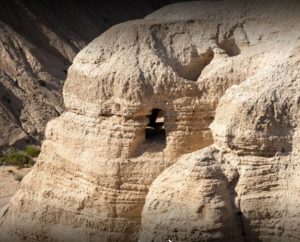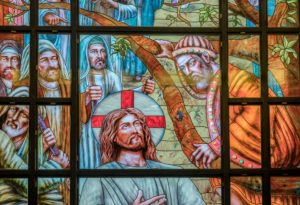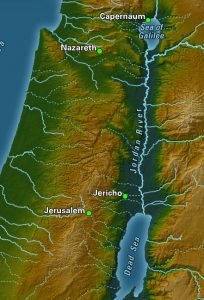Last time we gave a brief history of the Qumran community and the priests of the temple in order to understand the environment of Jesus’ time. The notion of the Kingdom of God to the religious Jews to whom Jesus ministered was military. The Essenes believed they would be soldiers in that kingdom and fight against the Hasmoneans. Others wanted to fight against the Romans. And there was much speculation about who would be the Messiah to deliver them.
 The Essene community of Qumran was very pious. They were scrupulous and detailed in their attention to piety. And they were celibate. Josephus tells us that in order for this celibate group of people not to die out, the Essenes adopted orphans of priestly families and raised them in their community. This is a good guess as to what happened with John the Baptist. John was born to very elderly parents – his mother Elizabeth was so old that she already had the nickname “the barren one” in her village and his father Zechariah had served as a priest in the temple for many years. The Essenes may have adopted him before he reached adulthood, since he came from a priestly family. If this is the case, John’s young years may have been at Qumran.
The Essene community of Qumran was very pious. They were scrupulous and detailed in their attention to piety. And they were celibate. Josephus tells us that in order for this celibate group of people not to die out, the Essenes adopted orphans of priestly families and raised them in their community. This is a good guess as to what happened with John the Baptist. John was born to very elderly parents – his mother Elizabeth was so old that she already had the nickname “the barren one” in her village and his father Zechariah had served as a priest in the temple for many years. The Essenes may have adopted him before he reached adulthood, since he came from a priestly family. If this is the case, John’s young years may have been at Qumran.
It is clear that John was preaching and baptizing in the “front yard” of Qumran. If he was raised at Qumran, he had left the order by the time of his ministry. John’s message was almost identical to what was found in the apocalyptic text at Qumran. “Prepare ye the way of the Lord.” More fragments of this text in Isaiah 40 were found at Qumran than any other text. This is the theme text of Qumran. They believed they were preparing the country for national renewal – renewal of temple and state – and resisting occupation. There are all sorts of similarities between John and the Qumran community. According to the Gospels, John lived alone in the wilderness. We don’t know if he was expelled from the community or if he chose to leave the community, but he was preaching near Qumran the same theme text of the Qumran community. Because of these things, most scholars believe that John at some point was exposed to the Qumran community. Probably some of John’s best friends were Essenes.
John was not the only one living alone in the wilderness. Some of the people living in the wilderness were those with leprosy who could not live in the town; some were fugitives from justice; some were Zealots; and some may have had a particular need for reflection and preparation and believed they needed to live in the wilderness of preparation.
 The wilderness of Judea has five small springs where you find bulrushes. Jesus said to the crowds who would have listened to John, “What did you go out into the wilderness to see? A reed (bulrush) blowing gently in the breeze? Someone dressed in soft robes?” No. John was an apocalyptic, pulpit-pounding preacher. John, like Elijah, wore an animal skin. Because of this he was nicknamed Elijah. Jesus even said of John after his death, “Elijah has already come.” There was a tradition that Elijah would precede the coming of the Great King. At Jewish Passover, even to this very day, you put a place setting for Elijah to express the hope that Elijah and the Great Messiah will one day come.
The wilderness of Judea has five small springs where you find bulrushes. Jesus said to the crowds who would have listened to John, “What did you go out into the wilderness to see? A reed (bulrush) blowing gently in the breeze? Someone dressed in soft robes?” No. John was an apocalyptic, pulpit-pounding preacher. John, like Elijah, wore an animal skin. Because of this he was nicknamed Elijah. Jesus even said of John after his death, “Elijah has already come.” There was a tradition that Elijah would precede the coming of the Great King. At Jewish Passover, even to this very day, you put a place setting for Elijah to express the hope that Elijah and the Great Messiah will one day come.
John was in the wilderness when the word of God came to him. Isaiah used the ruggedness of the wilderness as a picture of our hearts. There are some pretty rough corners. In antiquity, people would go ahead of the king’s chariot smoothing the road and filling in the low places. They made it a smooth road. Today, we would say “roll out the red carpet.” Then, they would say, “make a broad road” to welcome the king. This also means to make a broad road in your rugged heart for the Lord.
 Many rabbis taught that if you ate with a tax collector you could not be a witness in court the rest of your life. Zacchaeus the tax collector at Jericho heard Jesus calling out to the sycamore tree, “Zacchaeus, I am coming to your house for dinner tonight.” Zacchaeus said, “Excuse me, did I hear you right?” Jesus invited himself to Zacchaeus’ house because Zacchaeus would never dream of inviting people to his house since no one would come. Probably when some of Jesus’ disciples families heard that Jesus went to a tax collector’s house for dinner, they sent letters to their sons and said, “If you keep going to that school, we won’t pay tuition next year!” This was a very controversial thing that Jesus did when he went to Zacchaeus’ house.
Many rabbis taught that if you ate with a tax collector you could not be a witness in court the rest of your life. Zacchaeus the tax collector at Jericho heard Jesus calling out to the sycamore tree, “Zacchaeus, I am coming to your house for dinner tonight.” Zacchaeus said, “Excuse me, did I hear you right?” Jesus invited himself to Zacchaeus’ house because Zacchaeus would never dream of inviting people to his house since no one would come. Probably when some of Jesus’ disciples families heard that Jesus went to a tax collector’s house for dinner, they sent letters to their sons and said, “If you keep going to that school, we won’t pay tuition next year!” This was a very controversial thing that Jesus did when he went to Zacchaeus’ house.
In John’s message he reached out to collaborators with the occupying Roman army. Matthew was a tax collector who had already heard John on his way to the temple. Luke singles out that John ministers to those who are sons of darkness (tax collectors and soldiers) according to the Qumran community. We know that Herod used Gentiles as soldiers and not Jews. John told the soldiers not to extort money from anyone through threats or false accusations and be satisfied with your wages.
For John there had to be a war before the Kingdom would be revealed. There would be a period of great tribulation and the throne of David would be restored. This is radically different than Jesus’ view, which is that the Kingdom of God is now! It has already begun in your period. This is a very important distinction. Jesus’ movement grew out of the John the Baptist movement. When people heard that John baptized Jesus, they considered Jesus a member of the John the Baptist apocalyptic movement.
We understand where John got his notion since we discovered the Qumran documents which held the prevailing view that God’s Kingdom must be brought by violence. They believed David’s kingdom would be restored and there would be no dirty, stinking, rotten, lousy Romans within the borders. How could this be accomplished without violence. The enemy, the Roman occupiers, must be destroyed.
John baptized from Bethany of Jordan to Aenon and Salem. That is the way John’s Gospel describes the borders of Perea and Samaria and Judea. It is a Jewish area where John was baptizing. When did people hear John preach? They heard him whenever they went to Jerusalem. Over the years, a lot of Galileans would have heard John preach as they made their way to Jerusalem. Josephus says that John was greatly respected throughout all of Israel. Many people had heard about John and his ministry. We do not know how long John ministered before Jesus began his ministry. Jesus’ ministry was only a couple of years long and John had probably ministered a number of years before Jesus began his ministry. On Palm Sunday, the people singing “Hosanna” were probably all followers of John. They believed to the very last that Jesus was going to lead a physical war against Rome. Even Jesus’ disciples had heard enough kingdom parables that they too believed this. If you had lived under Roman occupation for ninety years and if your scriptures had verses about the great prophets, the great priests, and the great king, you would only memorize the great king verses. When you are yelling, “God deliver us,” at Passover when Messiah will be announced, you would be trying to show Jesus that there are enough of us this Passover for you to unite us in a battle against Rome.
All of Judea went out to hear John according to the Gospels. This is an exaggeration that is similar to when we say, “everybody was there.” Not every man, woman, and child in Judea went out to hear John but John’s gospel tells us that not only those in Judea but those in Idumea and Nabataea went out to hear John. We know from Acts that even people from Ephesus have heard John.
We now realize we cannot overestimate the popularity or respect that John the Baptist enjoyed even though he was a wilderness preacher. Unlike the Qumran community, he was not cloistered. He spoke to crowds who came out to hear him. John differed from the Essenes by speaking to Roman tax collectors and soldiers. John attempted interfaith dialogue and spoke to soldiers and Gentiles. Roman soldiers went out to hear John. There was something about the challenge of a purer way that even appealed to the soldiers of the occupying army.
 The Jordan River is a symbol of passage. It was a passage from wilderness to the Promised Land in Joshua. The symbol of passage to the Promised Land became the place where John chose to have a baptism of renewal. We should not be surprised that John quoted Isaiah. The area from which John preached included views of cliffs, valleys, and mountains. There was no easy road to Jerusalem. It was a rugged wilderness. Just like the land does not have a straight and easy road to Jerusalem, our hearts need a lot of work to get ready for the Great King.
The Jordan River is a symbol of passage. It was a passage from wilderness to the Promised Land in Joshua. The symbol of passage to the Promised Land became the place where John chose to have a baptism of renewal. We should not be surprised that John quoted Isaiah. The area from which John preached included views of cliffs, valleys, and mountains. There was no easy road to Jerusalem. It was a rugged wilderness. Just like the land does not have a straight and easy road to Jerusalem, our hearts need a lot of work to get ready for the Great King.
It is interesting to note that baptism by John in the Jordan River, which is a symbol of passage from wilderness to Canaan, is a symbol of passage into preparing one’s life for the Lord’s kingdom and it is also a passage of repentance. This acknowledges that the kingdom is more than just preparing one’s self with learning how to use a weapon. John also knew that there would be deeper levels to the Kingdom of God. John spoke of justice and righteousness issues.
The Jordan symbolizes two of the things that are found throughout the book of Joshua: 1) God gave them the land, and 2) Israel took the land. It is very important to see this double tension in Joshua. In Joshua, the battle at Jericho should probably be called the “fall of Jericho” since there was a terrible earthquake. There was no battle. The battle orders called for the soldiers to circumcise themselves. (A generation that had lived in the wilderness had stopped circumcision.) Circumcision is not generally considered good military preparation for battle. Picture them marching rather gingerly around Jericho. It is meant to be humorous in the sense that “God gave them Jericho.” The walls fell. They did not fight for it.
The choosing of the Jordan River for baptism is a reminder to us that the kingdom is not to be associated with being taken by force. There was a gift from God at the Jordan at the fall of Jericho, not the battle of Jericho.
In the Hebrew Bible, the “Kingdom of God is Now” began happening at the crossing of the Jordan and the fall of Jericho. There were things that God did in advance of the Israelites taking the land. Grace is a gift, whereas works is an effort. Jesus was speaking about a Kingdom of God inaugurated by grace. The Jordan River and Jericho remind us of the gifts of God.
Jesus said the greatest of the followers of John are not as great as the least of my followers. The context of this is very interesting. Jesus had utmost respect for John. Jesus said of John, “Of a woman no greater person was born than John.” What did Jesus mean? For someone who believes the Kingdom of God is only future and must be ushered in by powerful signs and battles, they are not as blessed or as great as someone who believes you can find God’s Kingdom now. Those who have already begun to be able to see the kingdom are more privileged to have witnessed it. The statement is not a negative towards John – John was announcing and preparing the way.
Those who are able to see that god’s kingdom is already here are far more blessed than those who are waiting for something big in the future. How do we recognize God’s kingdom? It is very sad when people become so tied up with prophecy in the book of Revelation and the final battle that they are not able to see the kingdom now. It was sad for Jesus to think that the kingdom was seen in battles and violence.
God’s activity is taking place outside our front doors. This is a different place than we think to look for God’s Kingdom. If we can see it, we will be greater than anyone born of woman. It is a privilege to be a part of God’s activity. Jesus was not putting John down. John was saying the kingdom is coming and Jesus was saying that anyone who can see God’s activity now is greater.
It is difficult sometimes to witness the difficulties of our world, the injustice and imbalance. Just as it was difficult for the people of Jesus and John’s time to live under the rule of the Romans. If we can begin to see the Kingdom of God that is now, we are privileged and blessed by the gift.
